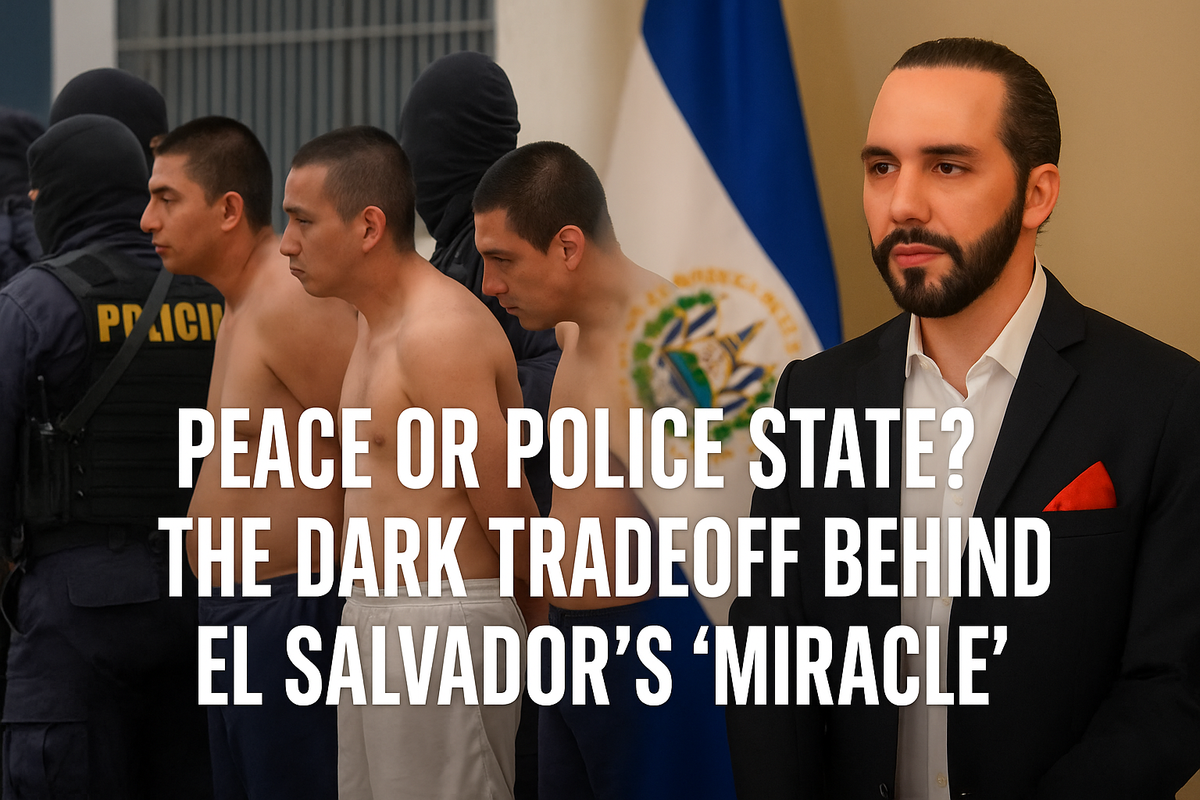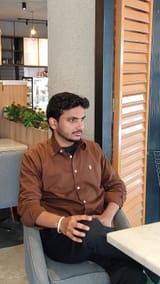Peace or Police State? The Dark Tradeoff Behind El Salvador’s ‘Miracle’
El Salvador’s dramatic drop in murders is celebrated as a miracle. Yet mass arrests, secret prisons, and disappearing civil liberties reveal a darker truth: trading democracy for security. Critics warn this model risks creating a permanent police state.

For decades, El Salvador was the epicenter of gang violence, extortion, and the planet's highest murder rate. In 2015 alone, this tiny Central American country of a little over 6 million had over 6,600 homicides an eye-popping 103 per 100,000 inhabitants. San Salvador and Soyapango streets turned into kill zones. Whole neighborhoods were terrorized by MS-13 and Barrio 18, with locals shelling out "renta" or risk deadly reprisals.
Flash forward to 2025. The murder rate has fallen by over 80%. The streets are quieter. Tourism is up. And President Nayib Bukele is bragging about what he refers to as "The Salvadoran Miracle."
But scratch beneath the glossy PR and you’ll find a far more troubling reality. Mass detentions, secret prisons, and allegations of systematic human rights abuses have sparked outrage among NGOs and legal scholars. Critics argue that El Salvador is trading civil liberties for superficial stability, inching closer to a police state under authoritarian rule.
So what is the actual price of this purported miracle? And is El Salvador's crackdown a model or lesson on how to deal with organized crime for other nations struggling with it?
Let's unwrap the layers.
The Bukele Crackdown: From Homicide Crisis to Mass Arrests
In 2019, Nayib Bukele became president of El Salvador with a vow to do the unthinkable: put an end to gang domination—whatever the cost.
By 2022, after a brutal surge in murders, Bukele issued a state of emergency. Under this broad edict:
- Constitutional protections were suspended.
- Police and military were empowered to arrest suspects without warrants.
- New mega-prisons were constructed to accommodate tens of thousands.
According to El Salvador's Ministry of Security, more than 80,000 have been detained since the crackdown started about 1 in every 75 Salvadorans.
Its defenders claim it succeeded. Homicides fell to record lows. Extortion rackets were dismantled. Bukele's approval ratings reached more than 85%, the highest in the Americas.
But the Observer has this: independent witnesses claim thousands of detainees have no established connections to gangs whatsoever. Relatives report loved ones going missing without due process. Human Rights Watch and Amnesty International have documented dozens of in-custody deaths, mysterious disappearances, and savage beatings.
Peace, yes. But at what cost?
A New Kind of Fear: When Security Becomes Oppression
El Salvador was once terrorized by gangs. Now, lots of people say it's terrorized by the state itself.
Look at these documented cases:
- Marisol, 42, was arrested because she sold pupusas in front of her home in a neighborhood that had been designated a "red zone." No proof of gang affiliation was ever offered. Her family has heard nothing from her for 11 months.
- José, 17, was held on the way home from school because he wore a tattoo on his wrist. His mother maintains it was the name of his deceased brother, and not a gang logo.
- Anonymous accounts gathered by human rights observers detail overpacked cells in prisons where detainees are on their feet for days with no food and no access to attorneys.
This atmosphere of fear has led the United Nations to call for accountability. But Bukele's government continues to be obstinate, labeling critics as "foreign agents" and "campions of criminals."
It's a tried-and-tested playbook: make dissent treason, vilify NGOs, and weaponize nationalism. In the short term, it pays. In the long run, it eats away at democracy.
The Digital Authoritarianism Factor
Bukele is not only cracking down with police raids he's also leading the charge on digital propaganda. His government has a battalian of bots and influencers spewing pro-government messages across social media.
A 2024 Center for Strategic and International Studies report discovered:
- Hundreds of Twitter handles parroting official statements and harassing journalists.
- State-sponsored hashtags intended to overwhelm critical reporting.
- Selective dumping of prison videos of embarrassed detainees—intended to instill fear.
This is not governance. It's digital authoritarianism, designed for an age when perception is as important as policy.
Public Opinion: Complicity or Survival?
Here's the disturbing reality: Most Salvadorans approve of the crackdown.
Decades of being under the control of brutal gangs have left many believing that mass arrests are a required evil. The polls don't lie—Bukele's approval ratings are still through the roof.
Sociologists explain this as a time-tested pattern in crime-battered societies:
- Extremity of violence breeds desperation.
- An iron-fisted leader promises swift results.
- People trade freedom for order.
But history warns us: once power expands unchecked, it rarely recedes.
Today, it’s gang members. Tomorrow, it could be political opponents, journalists, or ordinary citizens who dare to dissent.
International Silence: Why the World Looks Away
You’d think mass detentions and secret prisons would spark global outrage. But many governments have been conspicuously silent.
Why?
- El Salvador is no longer inundating the U.S. border with refugees. Washington likes stability over complicated human rights discourse.
- Foreign investors are enamored with the new story of security and tourism. Bitcoin City, surfing tournaments, and slick PR efforts divert attention from nasty realities.
- Local governments notice Bukele's popularity and ask themselves if the same recipe could be applied domestically.
This handy forgetfulness has given Bukele courage. The message is unmistakable: so long as you produce "results," the world will turn a blind eye.
A Perilous Precedent for Latin America
El Salvador's tactics are now being emulated by other leaders who have to deal with cartels and gangs:
- In Honduras, President Xiomara Castro has declared the same emergency powers.
- In Ecuador, President Daniel Noboa is sending the military to patrol cities.
- In Mexico, right-wing voices are applauding Bukele's "mano dura."
But specialists warn that copying Bukele undermines the possibility of a region of democracies drifting into permanent exception states where power knows no bounds and human rights are elective.
When the benchmark of success is mass incarceration and suspended rights, there is no easy undo.
The Fine Line Between Justice and Vengeance
If you ask Salvadoran officials, they will tell you that this is merely the price of justice. But justice is different from vengeance.
Justice is founded on due process, evidence, and proportionality.
Vengeance is mass punishment arresting thousands without evidence, vanishing suspects into legal black holes, and allowing them to rot because it's convenient politically.
A good society needs to be able to see a difference.
Will El Salvador's Miracle Last
The million-dollar question: Is this model sustainable?
Opponents say the crackdown does nothing to attack the causes of gang violence poverty, inequality, and a lack of opportunity.
Already, there are indications the underlying problems persist:
- Rural youth continue to be jobless.
- Urban neighborhoods remain tainted.
- Corruption within the police continues.
When you imprison tens of thousands on minimal evidence, you might just be creating a new generation of embittered young men who view the state as the enemy. That fact is a time bomb, not a solution.
Conclusion: Peace or Police State?
El Salvador is safer today than it has been in decades. That much is certain.
But so is this: the price of safety has been the slow strangulation of civil liberties.
If you define success in terms of homicide rates alone, you will label this as a miracle. If you measure it in terms of the health of democracy, it appears more like a warning.
It will happen one day, when the iron fist has finished its work and the aura of stability has worn off, that Salvadorans will find out that fear never did vanish it just switched uniforms.
And the rest of the world, hungry for quick fixes to complex problems, should pay close attention.
Because if El Salvador’s miracle becomes the blueprint, we’re all in danger of waking up in a world where the ends justify any means.
Sources
- CourtListener
- Justia
- Archive.org
- Google Trends
- Official press releases from the Government of El Salvador (www.presidencia.gob.sv)
- Human Rights Watch
- Amnesty International
- Reuters
- The New York Times
- BBC News
For more legal exposes and truth-behind-glamour stories, subscribe to AllegedlyNewsNetwork.com




